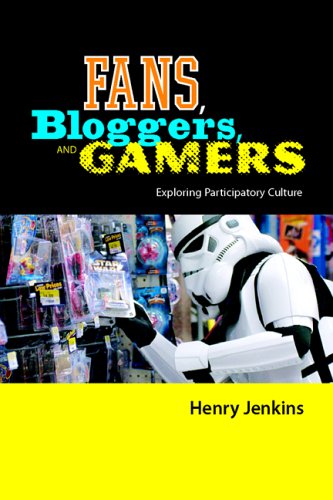Context of Practice 3
Thomas Squire
Archives
- Thursday, 21 November 2013
- In DISCOVER, DISSERTATION, OUGD601
- 0 Comments
DISCOVER: Convergence Culture

Jenkins, H. (2008) Convergence Culture. New York: New York University Press.
Discovered
Jenkins, a key theorist that is underpinning my research explores within the text the pivotal moment we are currently at within society where old and new media collide, it is explored how media is transitioning from old media formats and distribution like Television to new format and platforms such as YouTube which exploit the concepts and efficiencies of the internet to provide media to audiences in new ways.
Key Quotes
Discovered
Jenkins, a key theorist that is underpinning my research explores within the text the pivotal moment we are currently at within society where old and new media collide, it is explored how media is transitioning from old media formats and distribution like Television to new format and platforms such as YouTube which exploit the concepts and efficiencies of the internet to provide media to audiences in new ways.
Key Quotes
‘Old rules are open to change and companies’ are being ‘forced to renegotiate their relationship to consumers.’
‘Better “readers” of their own culture and more self-reflective and critical of the culture they occupy’
‘The power of participation’ which ‘comes not from destroying [their] commercial culture but from writing over it, modding it, amending it, expanding it, adding greater diversity of perspective, and then recalculating it, feeding it back into the mainstream media.’
‘Participation is less under the control of media producers and more under the control of media consumers’
‘Can’t decide what kind of relationship they want to have with this new kind of consumer.’
- Monday, 18 November 2013
- In DISCOVER, DISSERTATION, OUGD601
- 0 Comments
DISCOVER: Fans, Bloggers, and Gamers: Essays on Participatory Culture

Jenkins, H. (2006) Fans, Bloggers, and Gamers: Essays on Participatory Culture. New York: NYU Press Academic.
Discovered
This texts looks at how services like YouTube have in there prominence now become part of system that creates the culture we live, and it is the user of YouTube that are creating popular culture and because of this the mass media are loosing their power, control and influence they once held over there audiences.
DISCOVER: The Cult of the Amateur
Keen, A. (2011) The Cult of the Amateur: How Blogs, MySpace, YouTube and the Rest of Today's User Generated Media are Killing Our Culture and Economy. London: Nicholas Brealey Publishing.
Discovered
This text discusses the rise of the amateur, in the Web 2.0, every has become a creator, no longer is just a job for the professional to be creating content for the internet. Within this text it is explored how this new role within the audience is changing the media industries.
- Tuesday, 12 November 2013
- In DISCOVER, DISSERTATION, OUGD601
- 0 Comments
DISCOVER: The Wealth of Networks: How Social Production Transforms markets and Freedom
Benkler, Y. (2006) The Wealth of Networks: How Social Production Transforms markets and Freedom. New Haven: Yale University Press.
Discovered
Within this text it is explored that in the digital age the information industry has been revolutionised and anyone now has access to all the information on the planet and with this information it can be remixed and new information can be freely and easily produced and then distributed back to the world, however this has meant that it has had a significant detrimental effect on economies that profit from such information that is now being freely distributed for create by users for free.
Key Quotes
'Information, knowledge, and culture are central to human freedom and human development.'
'A series of changes in the technologies, economic organisation, and social practices of production in this environment has created new opportunities for how we make and exchange information, knowledge, and culture.'
- Saturday, 9 November 2013
- In DISCOVER, DISSERTATION, OUGD601
- 0 Comments
DISCOVER: Ephemeral Media: Transitory Screen Culture from Television to YouTube
Grainge, P. (2011) Ephemeral Media: Transitory Screen Culture from Television to YouTube. London: Palgrave Macmillan.
Discovered
This text focuses more on YouTube impact upon tranditional broadcast media such as Television. As YouTube continues to grow it's audiences, Television is loosing it's viewership, especially among younger audiences who want to have more control over what they watch and when they watch it.
Subscribe to:
Comments (Atom)
Archive
-
▼
2013
(36)
-
▼
November
(7)
- Lecture 4: Academic Conventions
- DISCOVER: Convergence Culture
- DISCOVER: Fans, Bloggers, and Gamers: Essays on Pa...
- DISCOVER: The Cult of the Amateur
- DISCOVER: The Wealth of Networks: How Social Produ...
- DISCOVER: Ephemeral Media: Transitory Screen Cultu...
- Lecture 3: Methodologies and Critical Analysis
-
▼
November
(7)
Copyright 2011 All rights reserved






